Reflective Essay on Academic Writing and Critical Thinking
VerifiedAdded on 2020/10/22
|7
|1379
|195
Essay
AI Summary
This reflective essay explores the author's experiences and insights into academic writing. It covers key aspects such as the importance of knowledge and creativity, the significance of referencing to avoid plagiarism, and the different types of academic writing including descriptive, analytical, persuasive, and critical. The essay also discusses academic writing strategies like time management and responding to assignments, the complexity and formality of written language, and the role of critical thinking in evaluating information. Additionally, it emphasizes the importance of reading for enhancing knowledge, improving vocabulary, and developing writing skills. The essay concludes by summarizing the key points and emphasizing the essential nature of these elements in academic success.
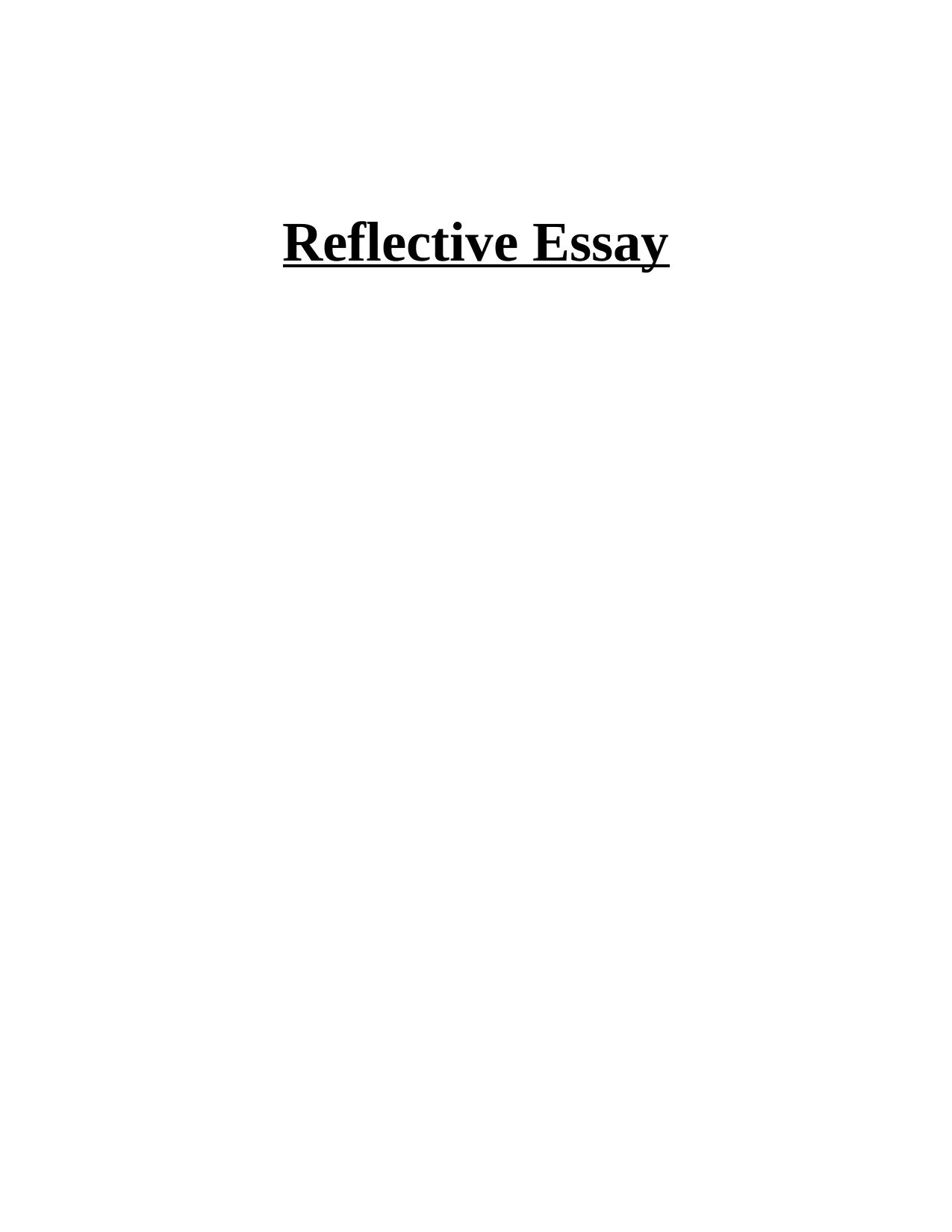
Reflective Essay
Paraphrase This Document
Need a fresh take? Get an instant paraphrase of this document with our AI Paraphraser
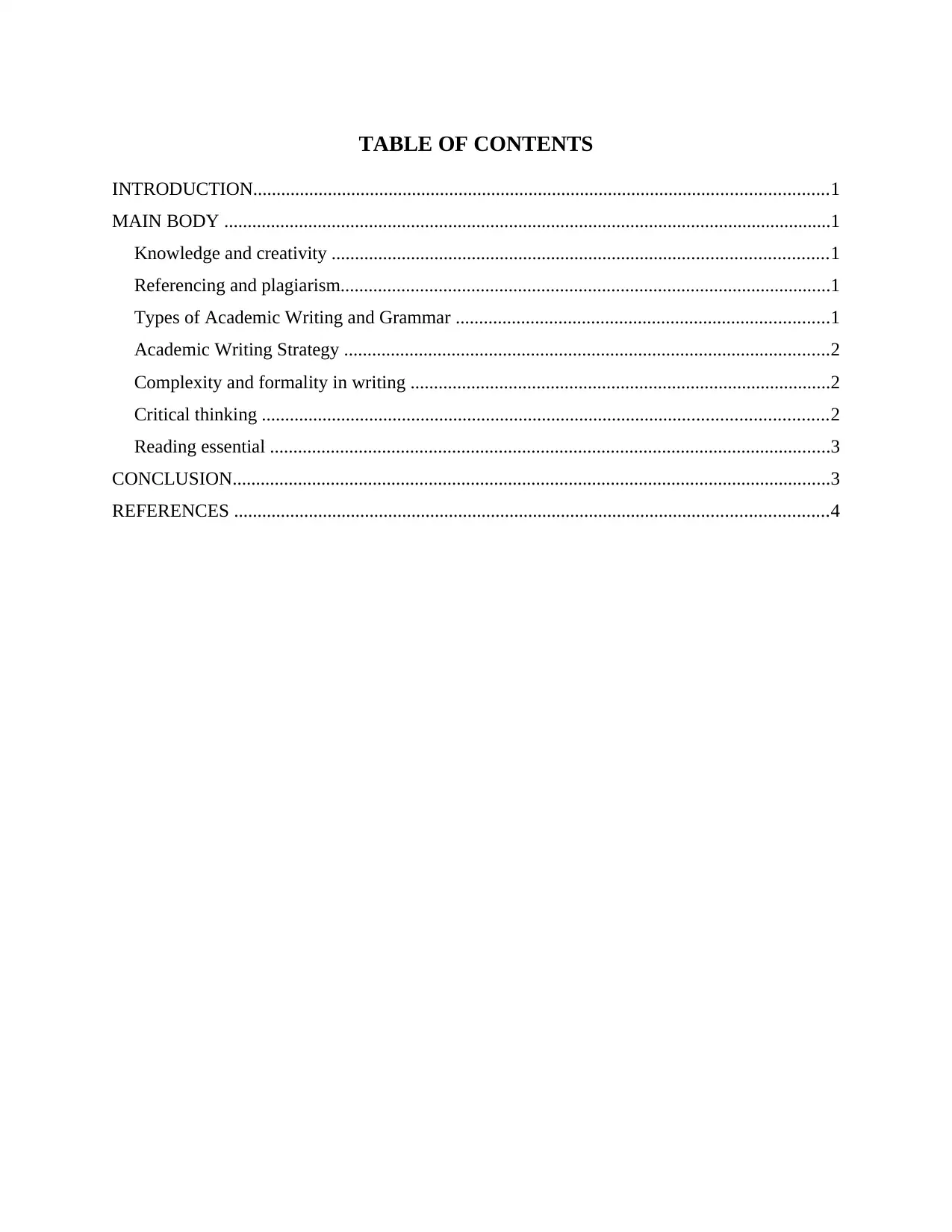
TABLE OF CONTENTS
INTRODUCTION...........................................................................................................................1
MAIN BODY ..................................................................................................................................1
Knowledge and creativity ..........................................................................................................1
Referencing and plagiarism.........................................................................................................1
Types of Academic Writing and Grammar ................................................................................1
Academic Writing Strategy ........................................................................................................2
Complexity and formality in writing ..........................................................................................2
Critical thinking .........................................................................................................................2
Reading essential ........................................................................................................................3
CONCLUSION................................................................................................................................3
REFERENCES ...............................................................................................................................4
INTRODUCTION...........................................................................................................................1
MAIN BODY ..................................................................................................................................1
Knowledge and creativity ..........................................................................................................1
Referencing and plagiarism.........................................................................................................1
Types of Academic Writing and Grammar ................................................................................1
Academic Writing Strategy ........................................................................................................2
Complexity and formality in writing ..........................................................................................2
Critical thinking .........................................................................................................................2
Reading essential ........................................................................................................................3
CONCLUSION................................................................................................................................3
REFERENCES ...............................................................................................................................4

⊘ This is a preview!⊘
Do you want full access?
Subscribe today to unlock all pages.

Trusted by 1+ million students worldwide
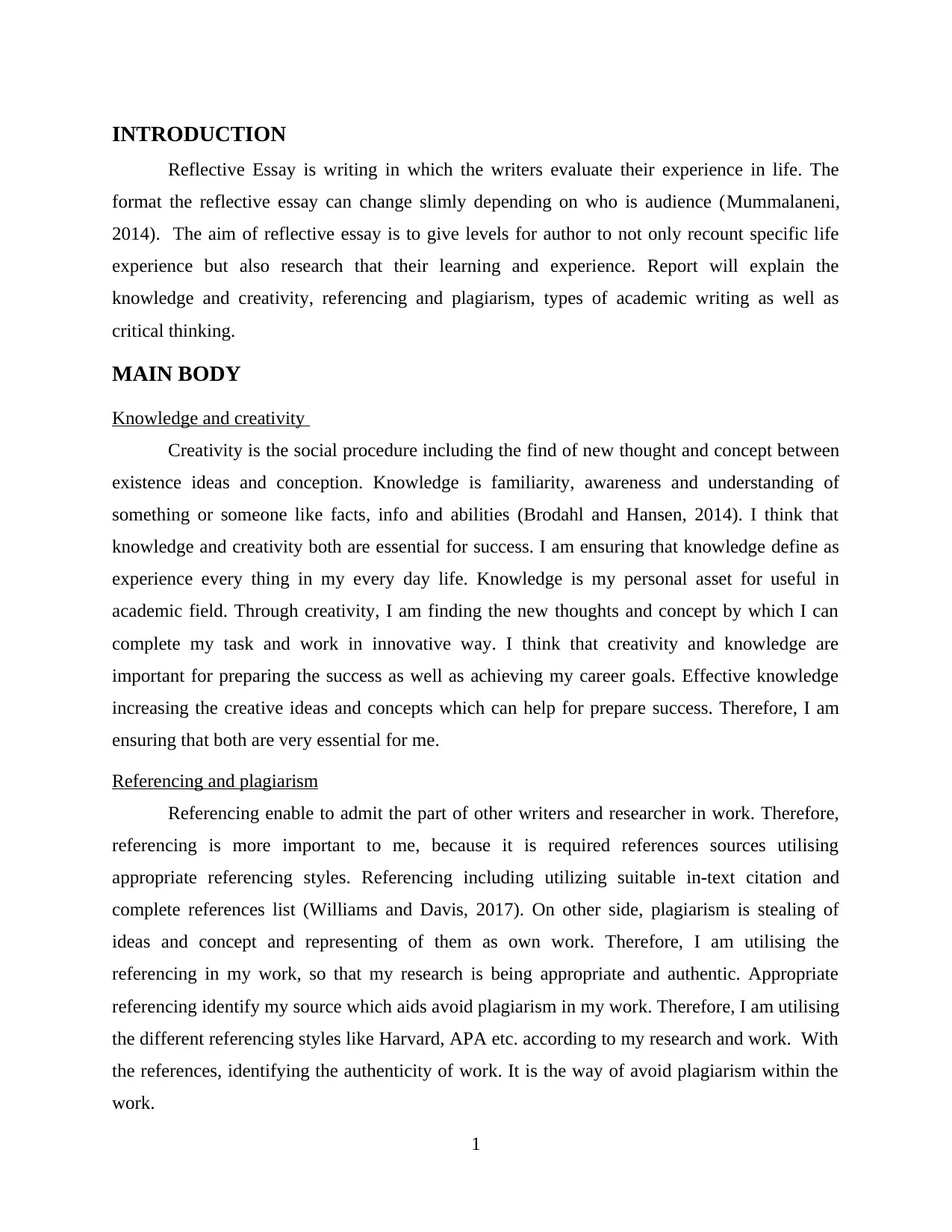
INTRODUCTION
Reflective Essay is writing in which the writers evaluate their experience in life. The
format the reflective essay can change slimly depending on who is audience (Mummalaneni,
2014). The aim of reflective essay is to give levels for author to not only recount specific life
experience but also research that their learning and experience. Report will explain the
knowledge and creativity, referencing and plagiarism, types of academic writing as well as
critical thinking.
MAIN BODY
Knowledge and creativity
Creativity is the social procedure including the find of new thought and concept between
existence ideas and conception. Knowledge is familiarity, awareness and understanding of
something or someone like facts, info and abilities (Brodahl and Hansen, 2014). I think that
knowledge and creativity both are essential for success. I am ensuring that knowledge define as
experience every thing in my every day life. Knowledge is my personal asset for useful in
academic field. Through creativity, I am finding the new thoughts and concept by which I can
complete my task and work in innovative way. I think that creativity and knowledge are
important for preparing the success as well as achieving my career goals. Effective knowledge
increasing the creative ideas and concepts which can help for prepare success. Therefore, I am
ensuring that both are very essential for me.
Referencing and plagiarism
Referencing enable to admit the part of other writers and researcher in work. Therefore,
referencing is more important to me, because it is required references sources utilising
appropriate referencing styles. Referencing including utilizing suitable in-text citation and
complete references list (Williams and Davis, 2017). On other side, plagiarism is stealing of
ideas and concept and representing of them as own work. Therefore, I am utilising the
referencing in my work, so that my research is being appropriate and authentic. Appropriate
referencing identify my source which aids avoid plagiarism in my work. Therefore, I am utilising
the different referencing styles like Harvard, APA etc. according to my research and work. With
the references, identifying the authenticity of work. It is the way of avoid plagiarism within the
work.
1
Reflective Essay is writing in which the writers evaluate their experience in life. The
format the reflective essay can change slimly depending on who is audience (Mummalaneni,
2014). The aim of reflective essay is to give levels for author to not only recount specific life
experience but also research that their learning and experience. Report will explain the
knowledge and creativity, referencing and plagiarism, types of academic writing as well as
critical thinking.
MAIN BODY
Knowledge and creativity
Creativity is the social procedure including the find of new thought and concept between
existence ideas and conception. Knowledge is familiarity, awareness and understanding of
something or someone like facts, info and abilities (Brodahl and Hansen, 2014). I think that
knowledge and creativity both are essential for success. I am ensuring that knowledge define as
experience every thing in my every day life. Knowledge is my personal asset for useful in
academic field. Through creativity, I am finding the new thoughts and concept by which I can
complete my task and work in innovative way. I think that creativity and knowledge are
important for preparing the success as well as achieving my career goals. Effective knowledge
increasing the creative ideas and concepts which can help for prepare success. Therefore, I am
ensuring that both are very essential for me.
Referencing and plagiarism
Referencing enable to admit the part of other writers and researcher in work. Therefore,
referencing is more important to me, because it is required references sources utilising
appropriate referencing styles. Referencing including utilizing suitable in-text citation and
complete references list (Williams and Davis, 2017). On other side, plagiarism is stealing of
ideas and concept and representing of them as own work. Therefore, I am utilising the
referencing in my work, so that my research is being appropriate and authentic. Appropriate
referencing identify my source which aids avoid plagiarism in my work. Therefore, I am utilising
the different referencing styles like Harvard, APA etc. according to my research and work. With
the references, identifying the authenticity of work. It is the way of avoid plagiarism within the
work.
1
Paraphrase This Document
Need a fresh take? Get an instant paraphrase of this document with our AI Paraphraser
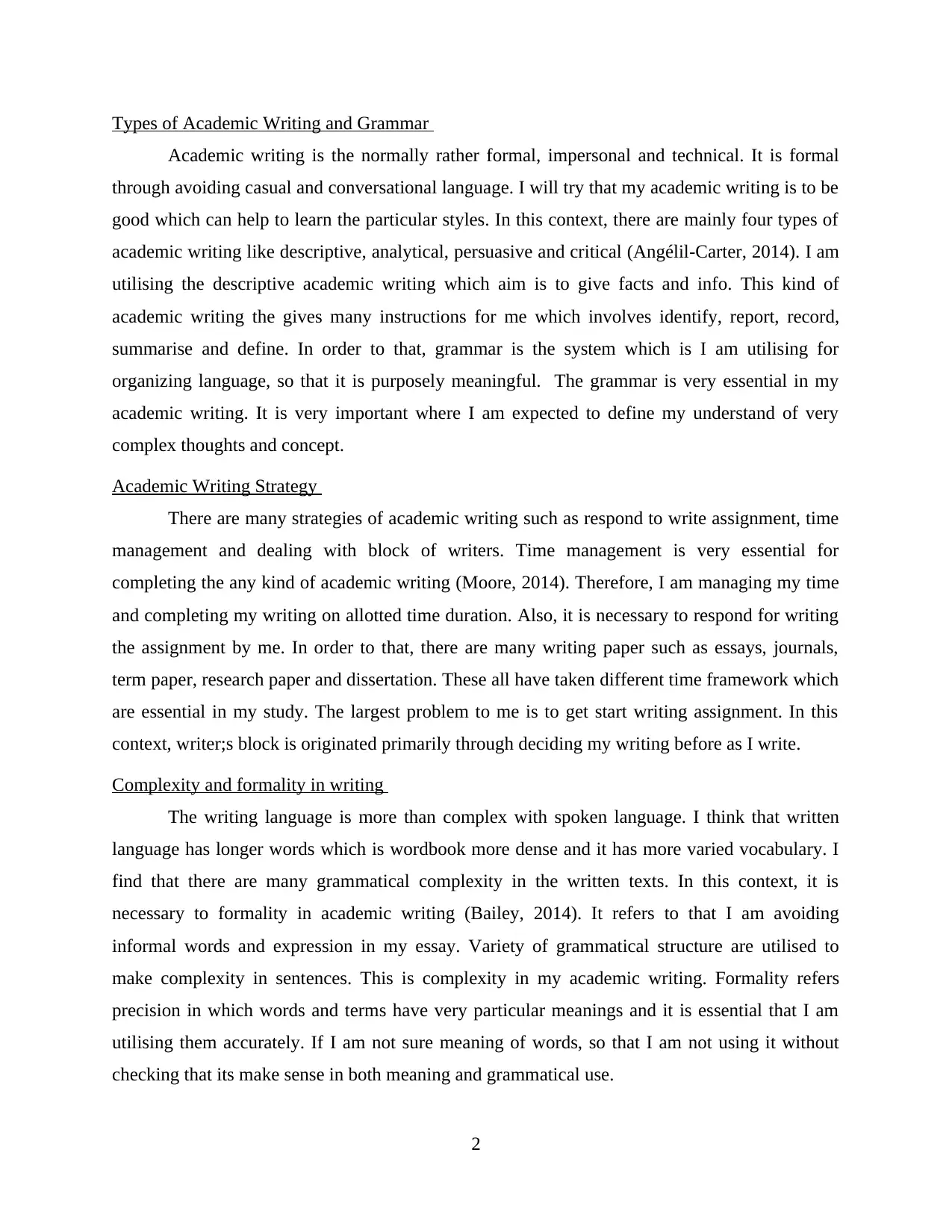
Types of Academic Writing and Grammar
Academic writing is the normally rather formal, impersonal and technical. It is formal
through avoiding casual and conversational language. I will try that my academic writing is to be
good which can help to learn the particular styles. In this context, there are mainly four types of
academic writing like descriptive, analytical, persuasive and critical (Angélil-Carter, 2014). I am
utilising the descriptive academic writing which aim is to give facts and info. This kind of
academic writing the gives many instructions for me which involves identify, report, record,
summarise and define. In order to that, grammar is the system which is I am utilising for
organizing language, so that it is purposely meaningful. The grammar is very essential in my
academic writing. It is very important where I am expected to define my understand of very
complex thoughts and concept.
Academic Writing Strategy
There are many strategies of academic writing such as respond to write assignment, time
management and dealing with block of writers. Time management is very essential for
completing the any kind of academic writing (Moore, 2014). Therefore, I am managing my time
and completing my writing on allotted time duration. Also, it is necessary to respond for writing
the assignment by me. In order to that, there are many writing paper such as essays, journals,
term paper, research paper and dissertation. These all have taken different time framework which
are essential in my study. The largest problem to me is to get start writing assignment. In this
context, writer;s block is originated primarily through deciding my writing before as I write.
Complexity and formality in writing
The writing language is more than complex with spoken language. I think that written
language has longer words which is wordbook more dense and it has more varied vocabulary. I
find that there are many grammatical complexity in the written texts. In this context, it is
necessary to formality in academic writing (Bailey, 2014). It refers to that I am avoiding
informal words and expression in my essay. Variety of grammatical structure are utilised to
make complexity in sentences. This is complexity in my academic writing. Formality refers
precision in which words and terms have very particular meanings and it is essential that I am
utilising them accurately. If I am not sure meaning of words, so that I am not using it without
checking that its make sense in both meaning and grammatical use.
2
Academic writing is the normally rather formal, impersonal and technical. It is formal
through avoiding casual and conversational language. I will try that my academic writing is to be
good which can help to learn the particular styles. In this context, there are mainly four types of
academic writing like descriptive, analytical, persuasive and critical (Angélil-Carter, 2014). I am
utilising the descriptive academic writing which aim is to give facts and info. This kind of
academic writing the gives many instructions for me which involves identify, report, record,
summarise and define. In order to that, grammar is the system which is I am utilising for
organizing language, so that it is purposely meaningful. The grammar is very essential in my
academic writing. It is very important where I am expected to define my understand of very
complex thoughts and concept.
Academic Writing Strategy
There are many strategies of academic writing such as respond to write assignment, time
management and dealing with block of writers. Time management is very essential for
completing the any kind of academic writing (Moore, 2014). Therefore, I am managing my time
and completing my writing on allotted time duration. Also, it is necessary to respond for writing
the assignment by me. In order to that, there are many writing paper such as essays, journals,
term paper, research paper and dissertation. These all have taken different time framework which
are essential in my study. The largest problem to me is to get start writing assignment. In this
context, writer;s block is originated primarily through deciding my writing before as I write.
Complexity and formality in writing
The writing language is more than complex with spoken language. I think that written
language has longer words which is wordbook more dense and it has more varied vocabulary. I
find that there are many grammatical complexity in the written texts. In this context, it is
necessary to formality in academic writing (Bailey, 2014). It refers to that I am avoiding
informal words and expression in my essay. Variety of grammatical structure are utilised to
make complexity in sentences. This is complexity in my academic writing. Formality refers
precision in which words and terms have very particular meanings and it is essential that I am
utilising them accurately. If I am not sure meaning of words, so that I am not using it without
checking that its make sense in both meaning and grammatical use.
2
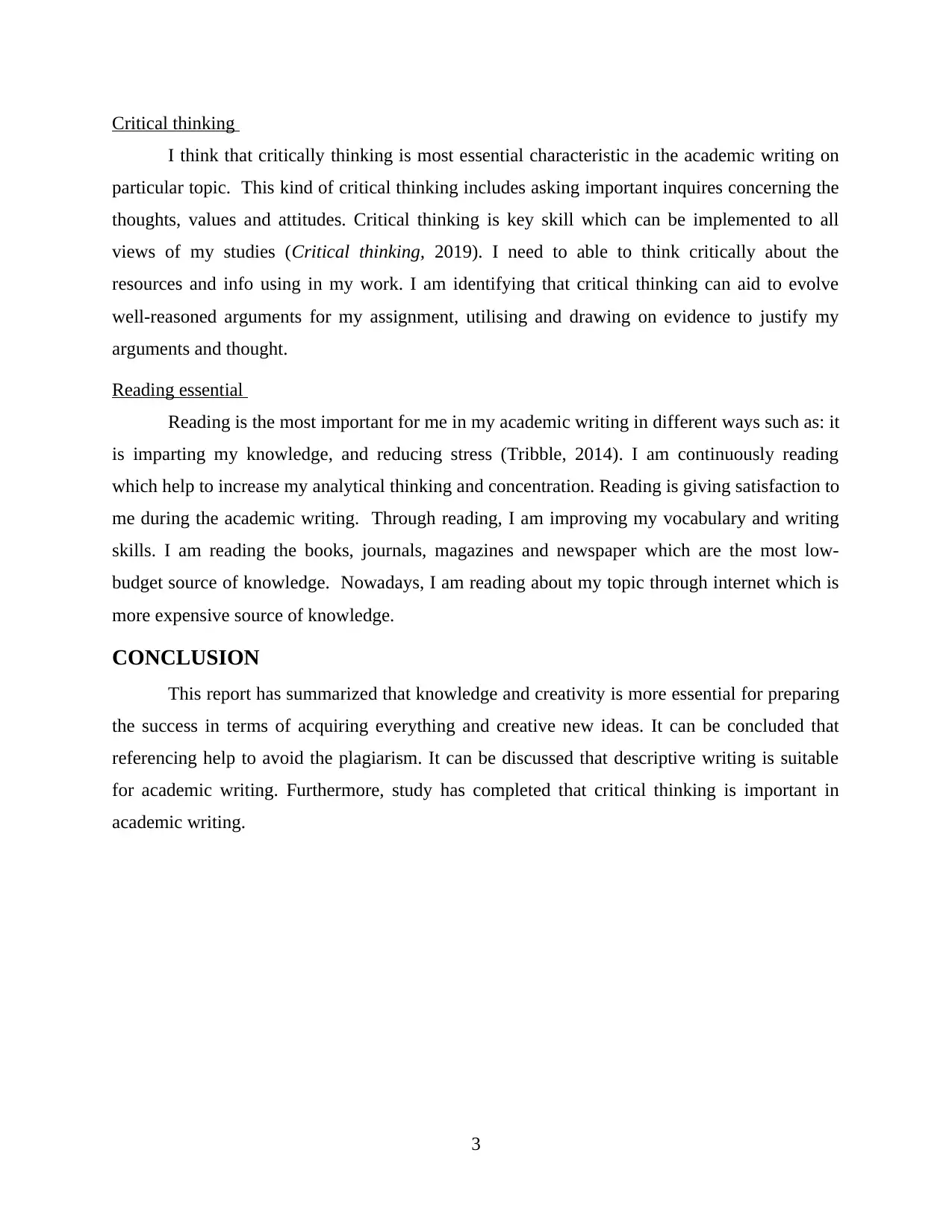
Critical thinking
I think that critically thinking is most essential characteristic in the academic writing on
particular topic. This kind of critical thinking includes asking important inquires concerning the
thoughts, values and attitudes. Critical thinking is key skill which can be implemented to all
views of my studies (Critical thinking, 2019). I need to able to think critically about the
resources and info using in my work. I am identifying that critical thinking can aid to evolve
well-reasoned arguments for my assignment, utilising and drawing on evidence to justify my
arguments and thought.
Reading essential
Reading is the most important for me in my academic writing in different ways such as: it
is imparting my knowledge, and reducing stress (Tribble, 2014). I am continuously reading
which help to increase my analytical thinking and concentration. Reading is giving satisfaction to
me during the academic writing. Through reading, I am improving my vocabulary and writing
skills. I am reading the books, journals, magazines and newspaper which are the most low-
budget source of knowledge. Nowadays, I am reading about my topic through internet which is
more expensive source of knowledge.
CONCLUSION
This report has summarized that knowledge and creativity is more essential for preparing
the success in terms of acquiring everything and creative new ideas. It can be concluded that
referencing help to avoid the plagiarism. It can be discussed that descriptive writing is suitable
for academic writing. Furthermore, study has completed that critical thinking is important in
academic writing.
3
I think that critically thinking is most essential characteristic in the academic writing on
particular topic. This kind of critical thinking includes asking important inquires concerning the
thoughts, values and attitudes. Critical thinking is key skill which can be implemented to all
views of my studies (Critical thinking, 2019). I need to able to think critically about the
resources and info using in my work. I am identifying that critical thinking can aid to evolve
well-reasoned arguments for my assignment, utilising and drawing on evidence to justify my
arguments and thought.
Reading essential
Reading is the most important for me in my academic writing in different ways such as: it
is imparting my knowledge, and reducing stress (Tribble, 2014). I am continuously reading
which help to increase my analytical thinking and concentration. Reading is giving satisfaction to
me during the academic writing. Through reading, I am improving my vocabulary and writing
skills. I am reading the books, journals, magazines and newspaper which are the most low-
budget source of knowledge. Nowadays, I am reading about my topic through internet which is
more expensive source of knowledge.
CONCLUSION
This report has summarized that knowledge and creativity is more essential for preparing
the success in terms of acquiring everything and creative new ideas. It can be concluded that
referencing help to avoid the plagiarism. It can be discussed that descriptive writing is suitable
for academic writing. Furthermore, study has completed that critical thinking is important in
academic writing.
3
⊘ This is a preview!⊘
Do you want full access?
Subscribe today to unlock all pages.

Trusted by 1+ million students worldwide
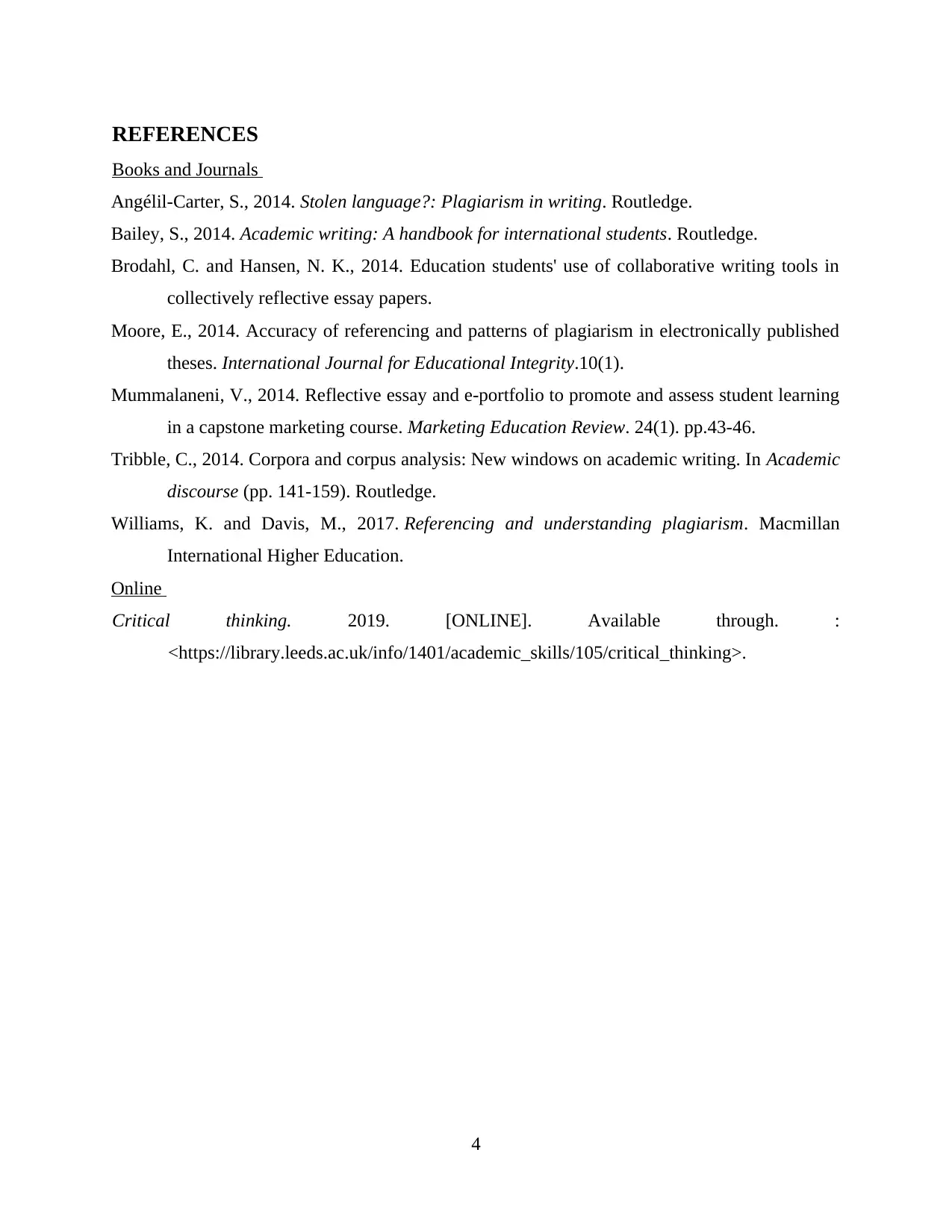
REFERENCES
Books and Journals
Angélil-Carter, S., 2014. Stolen language?: Plagiarism in writing. Routledge.
Bailey, S., 2014. Academic writing: A handbook for international students. Routledge.
Brodahl, C. and Hansen, N. K., 2014. Education students' use of collaborative writing tools in
collectively reflective essay papers.
Moore, E., 2014. Accuracy of referencing and patterns of plagiarism in electronically published
theses. International Journal for Educational Integrity.10(1).
Mummalaneni, V., 2014. Reflective essay and e-portfolio to promote and assess student learning
in a capstone marketing course. Marketing Education Review. 24(1). pp.43-46.
Tribble, C., 2014. Corpora and corpus analysis: New windows on academic writing. In Academic
discourse (pp. 141-159). Routledge.
Williams, K. and Davis, M., 2017. Referencing and understanding plagiarism. Macmillan
International Higher Education.
Online
Critical thinking. 2019. [ONLINE]. Available through. :
<https://library.leeds.ac.uk/info/1401/academic_skills/105/critical_thinking>.
4
Books and Journals
Angélil-Carter, S., 2014. Stolen language?: Plagiarism in writing. Routledge.
Bailey, S., 2014. Academic writing: A handbook for international students. Routledge.
Brodahl, C. and Hansen, N. K., 2014. Education students' use of collaborative writing tools in
collectively reflective essay papers.
Moore, E., 2014. Accuracy of referencing and patterns of plagiarism in electronically published
theses. International Journal for Educational Integrity.10(1).
Mummalaneni, V., 2014. Reflective essay and e-portfolio to promote and assess student learning
in a capstone marketing course. Marketing Education Review. 24(1). pp.43-46.
Tribble, C., 2014. Corpora and corpus analysis: New windows on academic writing. In Academic
discourse (pp. 141-159). Routledge.
Williams, K. and Davis, M., 2017. Referencing and understanding plagiarism. Macmillan
International Higher Education.
Online
Critical thinking. 2019. [ONLINE]. Available through. :
<https://library.leeds.ac.uk/info/1401/academic_skills/105/critical_thinking>.
4
1 out of 7
Related Documents
Your All-in-One AI-Powered Toolkit for Academic Success.
+13062052269
info@desklib.com
Available 24*7 on WhatsApp / Email
![[object Object]](/_next/static/media/star-bottom.7253800d.svg)
Unlock your academic potential
Copyright © 2020–2026 A2Z Services. All Rights Reserved. Developed and managed by ZUCOL.



